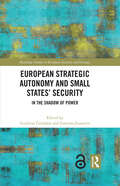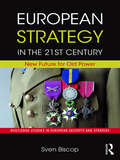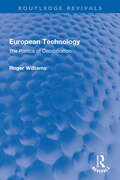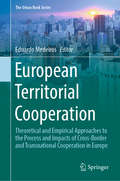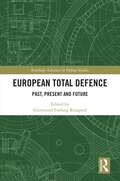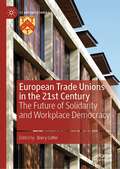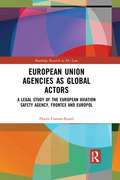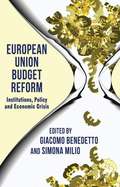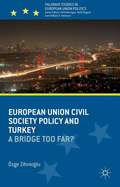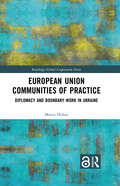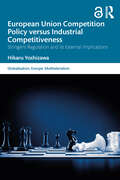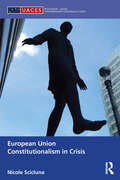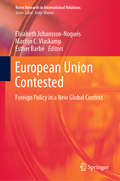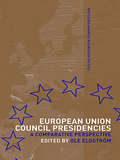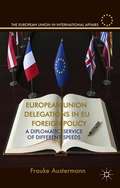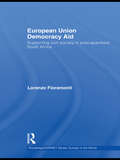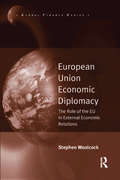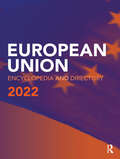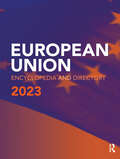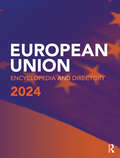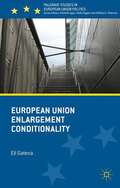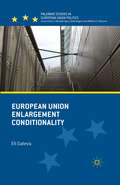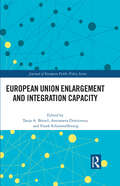- Table View
- List View
European Strategic Autonomy and Small States' Security: In the Shadow of Power (Routledge Studies in European Security and Strategy)
by Justinas Juozaitis Giedrius ČesnakasThis book analyses whether the EU’s drift towards European strategic autonomy presents a challenge or a window of opportunity for its small member states to advance their security interests. The volume presents small states’ perceptions of European strategic autonomy, highlighting their expectations and concerns. The chapters focus on the depth and breadth of European strategic autonomy, national security considerations, assessment of the impact on transatlantic relations, the expected outputs, and its potential impact on the EU’s institutional structure. It also shows how systemic circumstances and the interests of powerful states, either belonging to the EU (France, Germany, and Poland) or having a significant say in European security architecture (the US), establish opportunities and constraints for the small states to shape European strategic autonomy. In particular, the study focuses on the diverging interests of the Baltic states (Estonia, Latvia, and Lithuania), Belgium, Denmark, Greece, Hungary, and the Netherlands. It demonstrates that, in most cases, European strategic autonomy is perceived not as an alternative to NATO but as a supplementary element that could facilitate the development of national military capabilities, indigenous defence industries and resilience to non-military threats. Ultimately, the book suggests that national approaches towards European strategic autonomy mainly stem from pragmatic national security and foreign policy considerations, while largely ignoring grand strategic ideas. This book will be of much interest to students of European politics, security studies, and international relations.
European Strategy in the 21st Century: New Future for Old Power (Routledge Studies in European Security and Strategy)
by Sven BiscopThis book argues that Europe, through the European Union (EU), should act as a great power in the 21st century. The course of world politics is determined by the interaction between great powers. Those powers are the US, the established power; Russia, the declining power; China, the rising power; and the EU, the power that doesn’t know whether it wants to be a power. If the EU does not just want to undergo the policies of the other powers it will have to become one itself, but it should differ in its strategy. In this book, Sven Biscop seeks to demonstrate that the EU has the means to pursue a distinctive great power strategy, a middle way between dreamy idealism and unprincipled pragmatism, and can play a crucial stabilizing role in this increasingly unstable world. Written by a leading scholar, this book will be of much interest to students of European security, EU policy, strategic studies and international relations.
European Technology: The Politics of Collaboration (Routledge Revivals)
by Roger WilliamsFirst published in 1973, European Technology analyses the possibilities for cooperation and collaboration and suggests how the technology ‘gap’ between Europe and the United States can be bridged. Concentrating mainly on aerospace, nuclear and computer fields Roger Williams looks at the aspirations and achievements in technological cooperation both within the EEC and without. How can commitment to join projects be generated? What are the internal managerial and external political problems associated with joint action? How will technological collaboration contribute to wider European economic and political integration. The strength of the European economy will depend to a large extent on improved technological and industrial cooperation. This book provides the first theoretical foundation for policy making in this vital field. This book is a must read for scholars and researchers of European politics, European history and British politics.
European Territorial Cooperation: Cohesion, Development, Impact Assessment And Cooperation (Routledge Advances In European Politics Ser.)
by Eduardo MedeirosThis book fills an existing academic literature gap by providing a sound and synthetic analysis on the process of European Territorial Cooperation over the last 30 years. This follows from the support from the former EU INTERREG Community Initiative, since 1989, later transformed into the second main goal of EU Cohesion Policy, by 2007: European Territorial Cooperation - ECT. In order to present the ECT process in a more comprehensive manner, and to be the main literature reference regarding this process in the decades to come, this book is divided into four different sections and 12 chapters. The first section summarizes the main impacts and added-value from ETC experiences while proposing the elevation of the ETC goals within EU Cohesion Policies. The second section addresses the process of cross-border cooperation, and namely its impact in reducing border obstacles and supporting ever growing number of cross-border entities. The third section elaborates on the second most important ETC process (transnational cooperation) with a similar approach. Finally, a last section debates the future scenarios for this process in Europe.
European Total Defence: Past, Present and Future (Routledge Advances in Defence Studies)
by Paal Sigurd Hilde Floribert Baudet Toms Rostoks Joakim Berndtsson Jörg Noll Giedrius Česnakas Kevin D. Stringer Gjermund Forfang Rongved Theo Brinkel Sergii Glebov Denys Kuzmin Anne Roelsgaard Obling Rasmus Rannikko Colonel Mikael Salo Teija Sederholm Piotr Szymański Annelies Van Vark Viljar VeebelThis book analyses the origins, experiences, and challenges of total defence in Europe and comprises a broad spectrum of national case studies as well as one international organisation – NATO.The topic of total defence has been brought to the fore by deglobalisation, augmented international tension, the US pivot to Asia, grey‑zone threats, Covid‑19, and not least by the increased Russian threat during the 2010s, which culminated in the invasion of Ukraine in 2022. The analysis here is based on an in‑depth analysis of the four major Nordic countries, the Baltic countries, Poland, Ukraine, Switzerland, and the Netherlands, as well as a perspective from NATO itself. This volume argues that although the activity that we describe as total defence has many labels and various expressions, which follow from each country’s own history, geopolitical setting, and strategic culture, some aspects of it are to be found in most countries. This is because all countries, at least to some extent, will need their armed forces to rely on civil society in a crisis; however, it is a long way from this to a full‑fledged total defence concept. With continued international tension, the need to build resilient societies, and the European need to take more responsibility for its own security in a cost‑efficient way, this book argues that we should expect total defence to gain importance in the 21st century.This book will be of much interest to students of security studies, defence studies, European politics, and International Relations in general.
European Trade Unions in the 21st Century: The Future of Solidarity and Workplace Democracy (St Antony's Series)
by Barry ColferTrade unions in Europe face a range of cross-cutting challenges. This includes the near-universal contraction in union membership; the related decline of traditionally highly unionised blue-collar industries; and the rise of automation, microprocessing, and digitalisation, which can make it cheaper for employers to invest in machines than to pay humans to work. The breakdown of the standard contract of employment and increasing rates of precarious work have further transformed the world of work. Taken together, this makes any collectivist vision of society, and the notion of solidarity upon which trade unionism is built, difficult to sustain.All this raises tough questions for trade unionists, policy-makers, and researchers alike regarding the future of trade unions, the oldest and largest civil society movement in Europe. The contributions in this volume explore the prospects for union revival across a range of cases, including by focusing on the pursuit of legal remedies and on the opportunities associated with the network society to defend the interests of workers. This interdisciplinary volume includes contributions that consider the Czech Republic, Denmark, France, Finland, Germany, Spain, Sweden, Poland, the United Kingdom, and the EU level by researchers coming from a range of disciplines and backgrounds. The volume should especially appeal to researchers and practitioners working in the fields of political science, sociology, law, and business studies.
European Union Agencies as Global Actors: A Legal Study of the European Aviation Safety Agency, Frontex and Europol (Routledge Research in EU Law)
by Florin Coman-KundThis book examines a largely unexplored dimension of the European agencies, namely their role in EU external relations and on the international plane. International cooperation has become a salient feature of EU agencies triggering important legal questions regarding the scope and limits of their international dimension, the nature and effects of their international cooperation instruments, their status within the EU and on the global level, and leading potentially to tensions between EU law and international law. This book fills the existing knowledge gap by scrutinizing the international cooperation legal framework and practice of EU agencies, including their mandate, tasks and instruments, together with their legal status as actors with a global dimension. It sets out a general legal-analytical framework which combines legal parameters from EU and international law to assess EU agencies as global actors, and examines in detail three case studies on carefully selected agencies to shed light on the complexities of EU agencies’ daily international cooperation.
European Union Budget Reform
by Giacomo Benedetto Simona MilioA tension between (richer) contributing Member States and (poorer) recipient Member States has always characterised the history of the budget of the European Union, the politics of which has often turned fraught. This volume evaluates the prospects for major change to expenditure and the structure of the budget for the period starting in 2014.
European Union Civil Society Policy and Turkey: A Bridge Too Far? (Palgrave Studies in European Union Politics)
by Özge ZihnioğluDrawing on interviews with Civil Society organizations and in conjunction with an examination of EU Civil Society Policy and the legal and institutional environment in Turkey this book examines EU policies on Turkish Civil Society organizations and highlights the significant constraints and limited impacts of these policies.
European Union Communities of Practice: Diplomacy and Boundary Work in Ukraine (ISSN)
by Maren HofiusThis book provides a practice-based analysis of European Union (EU) diplomacy and community-building. Unlike studies focusing on how EU community-building proceeds centrally in Brussels, this book turns to EU diplomacy in its bordering state of Ukraine. At a time when the EU’s internal cohesion is being put to the test, this book provides novel insights into how feelings of belonging are produced amongst its members in the absence of a homogenous ‘we’. Transcending the traditional dichotomy between macro-structures and micro-processes of interaction, the book demonstrates that the EU’s large-scale community depends for its existence on practical instantiations of community-building in distinct ‘communities of practice’. Using the case of an EU diplomatic ‘community of practice’ in Kyiv, Ukraine, takes these questions to the EU’s margins, highlighting that the boundaries of community are key sites in which community materialises. The in-depth case study identifies diplomats’ ‘boundary work’ as the constitutive rule that makes the local ‘community of practice’ cohere and create feelings of belonging to the large-scale polity of the EU. This book will be of interest to researchers of European studies, as well as to those working on global cooperation and international relations more broadly.
European Union Communities of Practice: Diplomacy and Boundary Work in Ukraine (Routledge Global Cooperation Series)
by Maren HofiusThis book provides a practice-based analysis of European Union (EU) diplomacy and community-building. Unlike studies focusing on how EU community-building proceeds centrally in Brussels, this book turns to EU diplomacy in its bordering state of Ukraine. At a time when the EU’s internal cohesion is being put to the test, this book provides novel insights into how feelings of belonging are produced amongst its members in the absence of a homogenous ‘we’. Transcending the traditional dichotomy between macro-structures and micro-processes of interaction, the book demonstrates that the EU’s large-scale community depends for its existence on practical instantiations of community-building in distinct ‘communities of practice’. Using the case of an EU diplomatic ‘community of practice’ in Kyiv, Ukraine, takes these questions to the EU’s margins, highlighting that the boundaries of community are key sites in which community materialises. The in-depth case study identifies diplomats’ ‘boundary work’ as the constitutive rule that makes the local ‘community of practice’ cohere and create feelings of belonging to the large-scale polity of the EU. This book will be of interest to researchers of European studies, as well as to those working on global cooperation and international relations more broadly.
European Union Competition Policy versus Industrial Competitiveness: Stringent Regulation and its External Implications (Globalisation, Europe, and Multilateralism)
by Hikaru YoshizawaThe book examines whether EU competition policy is applied fairly and consistently to EU and non-EU firms despite persistent political pressure from member states for a relaxation of the rules and deals with the dilemma of regional organisations in the global political economy. Focussing on the EU’s desire to achieve balance between the promotion of market competition and the enhancement of international competitiveness, the book explores the validity of its attempts successfully to ensure a ‘stringent competition policy’ which is nationality-blind and comparatively strict. Finally, it shows that the competition-competitiveness dilemma remains unresolved because the EU’s capability to set global regulatory standards is constrained by competition and the need to engage in multilateral forums, such as the WTO and the International Competition Network. This book will be of key interest to scholars and students of European Union studies, EU competition law and policy, EU external action and more broadly to global governance, international political economy and international relations.
European Union Competition Policy versus Industrial Competitiveness: Stringent Regulation and its External Implications (ISSN)
by Hikaru YoshizawaThe book examines whether EU competition policy is applied fairly and consistently to EU and non-EU firms despite persistent political pressure from member states for a relaxation of the rules and deals with the dilemma of regional organisations in the global political economy. Focussing on the EU’s desire to achieve balance between the promotion of market competition and the enhancement of international competitiveness, the book explores the validity of its attempts successfully to ensure a ‘stringent competition policy’ which is nationality-blind and comparatively strict. Finally, it shows that the competition-competitiveness dilemma remains unresolved because the EU’s capability to set global regulatory standards is constrained by competition and the need to engage in multilateral forums, such as the WTO and the International Competition Network. This book will be of key interest to scholars and students of European Union studies, EU competition law and policy, EU external action and more broadly to global governance, international political economy and international relations.The Open Access version of this book, available at http://www.taylorfrancis.com, has been made available under a Creative Commons Attribution-Non Commercial-No Derivatives 4.0 license.
European Union Constitutionalism in Crisis (Routledge/UACES Contemporary European Studies)
by Nicole SciclunaSeveral years after the first Greek bailout, the integration project of the European Union faces an interlocking set of political, economic, legal and social challenges that go to the very core of its existence. Austerity is the order of the day, and citizens in both debtor and creditor states increasingly turn to the political movements of the far left and right, anti-politics and street protests to vent their frustration. This book demonstrates the limits of constitutionalism in the EU. It explores the ‘twin crises’ - the failure of the Constitutional Treaty in 2005 and the more recent Eurozone crisis - to illuminate both the possibilities and pitfalls of the integration project. It argues that European integration overburdened law in an attempt to overcome deep-seated political deficiencies. It further contends that the EU shifted from an unsuccessful attempt at democratisation via politicisation (the Constitutional Treaty), to an unintended politicisation without democratisation (the Eurozone crisis) only a few years later. The book makes the case that this course is unsustainable and threatens the goal of European unity. This text will be of key interest to students and scholars in the fields of EU studies, EU law, democracy studies, constitutional studies and international relations.
European Union Contested: Foreign Policy in a New Global Context (Norm Research in International Relations)
by Esther Barbé Elisabeth Johansson-Nogués Martijn C. VlaskampThe European Union's foreign policy and its international role are increasingly being contested both globally and at home. At the global level, a growing number of states are now challenging the Western-led liberal order defended by the EU. Large as well as smaller states are vying for more leeway to act out their own communitarian principles on and approaches to sovereignty, security and economic development. At the European level, a similar battle has begun over principles, values and institutions. The most vocal critics have been anti-globalization movements, developmental NGOs, and populist political parties at both extremes of the left-right political spectrum. This book, based on ten case studies, explores some of the most important current challenges to EU foreign policy norms, whether at the global, glocal or intra-EU level. The case studies cover contestation of the EU's fundamental norms, organizing principles and standardized procedures in relation to the abolition of the death penalty, climate, Responsibility to Protect, peacebuilding, natural resource governance, the International Criminal Court, lethal autonomous weapons systems, trade, the security-development nexus and the use of consensus on foreign policy matters in the European Parliament. The book also theorizes the current norm contestation in terms of the extent to, and conditions under which, the EU foreign policy is being put to the test.
European Union Council Presidencies: A Comparative Analysis (Routledge Advances in European Politics)
by Ole ElgströmThis book describes, analyses, explains and compares the role performance of different presidencies. The expert and international authors ask why member states have different approaches and play the role differently, prioritising different functions and using a variety of strategies to realise their aspirations. The book consists of three parts i) describes the functions of the presidency, ii) compares nine different presidencies and iii) a concluding section comparing media images, and summaries looking at member state characteristics and behaviour.
European Union Delegations in EU Foreign Policy
by Frauke AustermannThis first comprehensive study of the EU's diplomatic representation in the world, the EEAS, this book seeks to understand why it has failed to formulate a centralised policy towards external states. It also analyses why the EEAS has more success in centralising diplomatic structures in developing countries than with some economic partners.
European Union Democracy Aid: Supporting civil society in post-apartheid South Africa (Routledge/GARNET series)
by Lorenzo FioramontiSince the end of the Cold War, the promotion of democracy has occupied centre stage in global politics and in the academic debate on international relations. Governments, intergovernmental agencies, and international donors have invested significant resources to support the democratic consolidation of fledgling democracies. The European Union (EU), which is the largest aid donor in the world, has been no exception to this trend. This book focuses on the development aid provided by the EU to the South African democracy during its first ten years of life. EU Democracy Aid is the first book to empirically analyze the EU policy towards South Africa, which has been the most longstanding and comprehensive European democracy promotion initiative in a single country and an important test-bed for the EU’s effectiveness and credibility as a global democracy promoter. Building on the EU’s declared goal to promote democracy ‘from below’, this study explores the potential of micro-level projects aimed at ‘deepening’ democracy through grassroots civil society organizations operating in marginalized communities, where abusive and authoritarian practices often outlive the advent of democracy. It will be of interest to students and scholars of civil society, democracy, economics, development studies, European Union studies, political sociology and international relations.
European Union Economic Diplomacy: The Role of the EU in External Economic Relations (Global Finance)
by Stephen WoolcockThe European Union is a key player in international economic relations, but its exact role and how it goes about making decisions and negotiating is often poorly understood within and especially outside the EU. When does the EU play a proactive role and when does it follow? When is the EU a distinct actor and when is it just one level in a multi- level process of negotiation in which the member states are the main actors? Does the EU possess normative power in external economic relations? Does the EU have the capability and willingness to use its still significant economic power? European Union Economic Diplomacy provides the first comprehensive analysis of the factors that determine the role of the EU in economic diplomacy. In an up-to-date treatment that includes consideration of the impact of the Treaty of Lisbon, it contains a comprehensive explanation of decision making and negotiating processes in the core areas of trade, financial market regulation, environmental diplomacy and development co-operation. The book is intended for those interested in EU policy making, but also those who simply need to understand how the EU functions in the field of economic diplomacy.
European Union Encyclopedia and Directory 2022
by Imogen GladmanThoroughly updated, this extensive reference source provides in-depth information on all matters relating to the European Union (EU): the events surrounding the United Kingdom’s planned departure from the EU are covered in depth, including discussion and analysis of the potential implications for the future of the EU; the EU’s migration policy is evaluated, together with the EU’s legal and social frameworks; enlargement policy and environmental issues are discussed; and external relations and current security challenges are addressed. Key Features: an up-to date chronology of the EU from 1947 to present an A-Z section contains definitions and explanations of organizations, acronyms and terms, and articles on each member state. Comprising over 1,000 entries, terms listed include: Brexit; the European Institute for Gender Equality; Erasmus+; the European Maritime and Fisheries Fund; and the European System of Financial Supervision articles written by experts on the EU provide an overview of its policies and activities. a directory of principal names, addresses, telephone numbers, and e-mail and internet addresses of all major European Union institutions and their official bodies. This information is supplemented by summaries of important treaties, and details of EU-level trade and professional associations. Users will also find details of MEPs and the political groups and national parties contributing to the European Parliament a statistical survey gives tables covering: population, employment, agriculture, energy and mining, industry, the environment, finance, trade, transport and communications, tourism, health and welfare, and education across the EU This title will prove valuable to academic and public libraries, politicians and government agencies and the media, as well as to all those in need of accurate and reliable information on the European Union.
European Union Encyclopedia and Directory 2023
by Europa Europa PublicationsThoroughly updated, this extensive reference source provides in-depth information on all matters relating to the European Union (EU): EU energy policy in the context of the Russian Federation’s invasion of Ukraine is covered in depth, as is the impact of the COVID-19 crisis on EU policy; EU citizenship after Brexit is discussed, together with EU migration policy and the EU’s social framework; EU-Africa relations are reviewed, and current issues in overall foreign policy and security are addressed. Key Features: an up-to date chronology of the EU from 1947 to present an A-Z section contains definitions and explanations of organizations, acronyms and terms, and articles on each member state. Comprising some 1,000 entries, terms listed include: Brexit; the European Institute for Gender Equality; Next Generation EU; REPowerEU; and Team Europe articles written by experts on the EU provide an overview of its policies and activities. a directory of principal names, addresses, telephone numbers, and e-mail and internet addresses of all major European Union institutions and their official bodies. This information is supplemented by summaries of important treaties, and details of EU-level trade and professional associations. Users will also find details of MEPs and the political groups and national parties contributing to the European Parliament a statistical survey gives tables covering: population, employment, agriculture, energy and mining, industry, the environment, finance, trade, transport and communications, tourism, health and welfare, and education across the EU This title will prove valuable to academic and public libraries, politicians and government agencies and the media, as well as to all those in need of accurate and reliable information on the European Union.
European Union Encyclopedia and Directory 2024 (The European Union Encyclopedia and Directory)
by European UnionThoroughly updated, this extensive reference source provides in-depth information on all matters relating to the European Union (EU): EU energy policy in the context of the Russian Federation’s invasion of Ukraine is covered in depth, as is the impact of the COVID-19 crisis on EU policy; EU citizenship after Brexit is discussed, together with EU migration policy and the EU’s social framework; EU-Africa relations are reviewed, and current issues in overall foreign policy and security are addressed.Key Features: an up-to-date chronology of the EU from 1947 to present an A-Z section contains definitions and explanations of organizations, acronyms and terms, and articles on each member state. Comprising some 1,000 entries, terms listed include: Brexit; the European Institute for Gender Equality; Next Generation EU; REPowerEU; and Team Europe articles written by experts on the EU provide an overview of its policies and activities a directory of principal names, addresses, telephone numbers, and e-mail and internet addresses of all major European Union institutions and their official bodies. This information is supplemented by summaries of important treaties, and details of EU-level trade and professional associations. Users will also find details of MEPs and the political groups and national parties contributing to the European Parliament a statistical survey gives tables covering: population, employment, agriculture, energy and mining, industry, the environment, finance, trade, transport and communications, tourism, health and welfare, and education across the EU This title will prove valuable to academic and public libraries, politicians and government agencies and the media, as well as to all those in need of accurate and reliable information on the European Union.
European Union Enlargement Conditionality (Palgrave Studies in European Union Politics)
by Eli GatevaThe book provides the first comprehensive comparative analysis of the development of EU enlargement conditionality across four different enlargement waves - the first (2004) and the second (2007) phase of the Eastern enlargement, the EU enlargement to Croatia (2013), and the ongoing enlargement round involving Turkey and the Western Balkans.
European Union Enlargement Conditionality (Palgrave Studies in European Union Politics)
by Eli GatevaThe book provides the first comprehensive comparative analysis of the development of EU enlargement conditionality across four different enlargement waves - the first (2004) and the second (2007) phase of the Eastern enlargement, the EU enlargement to Croatia (2013), and the ongoing enlargement round involving Turkey and the Western Balkans.
European Union Enlargement and Integration Capacity (ISSN)
by Tanja A. Börzel Frank Schimmelfennig Antoaneta DimitrovaThe effects of the Eastern enlargement, the biggest so far, are still felt across the European Union (EU). Many warned the EU was about to overreach the limits of its integration capacity. More than a decade later, this book presents a broad-based and systematic evaluation of the 2004–2007’s enlargement and its impact on the EU.In contrast to widespread scepticism, our results show that the EU’s integration capacity has been strong. Credible accession conditionality and pre-accession assistance have had a positive impact on democracy, governance capacity, and economic transformation, at least before accession. After accession, EU institutions have proven resilient. Eastern enlargement has not affected negatively the legislative capacity of the EU. It has not led to a deterioration of compliance and implementation of EU law either; initial differentiated integration has quickly returned to normal levels.This generally positive assessment stands in stark contrast with increasing public opposition to future EU enlargements. We identify some less known sources of such opposition: the lack of communication and political debate about enlargement between EU leaders and their citizens. Public opposition undermines the credibility of EU conditionality, which is crucial for having a positive impact on neighbouring countries in the future. The chapters in this book originally appeared in a special issue in the Journal of European Public Policy.
